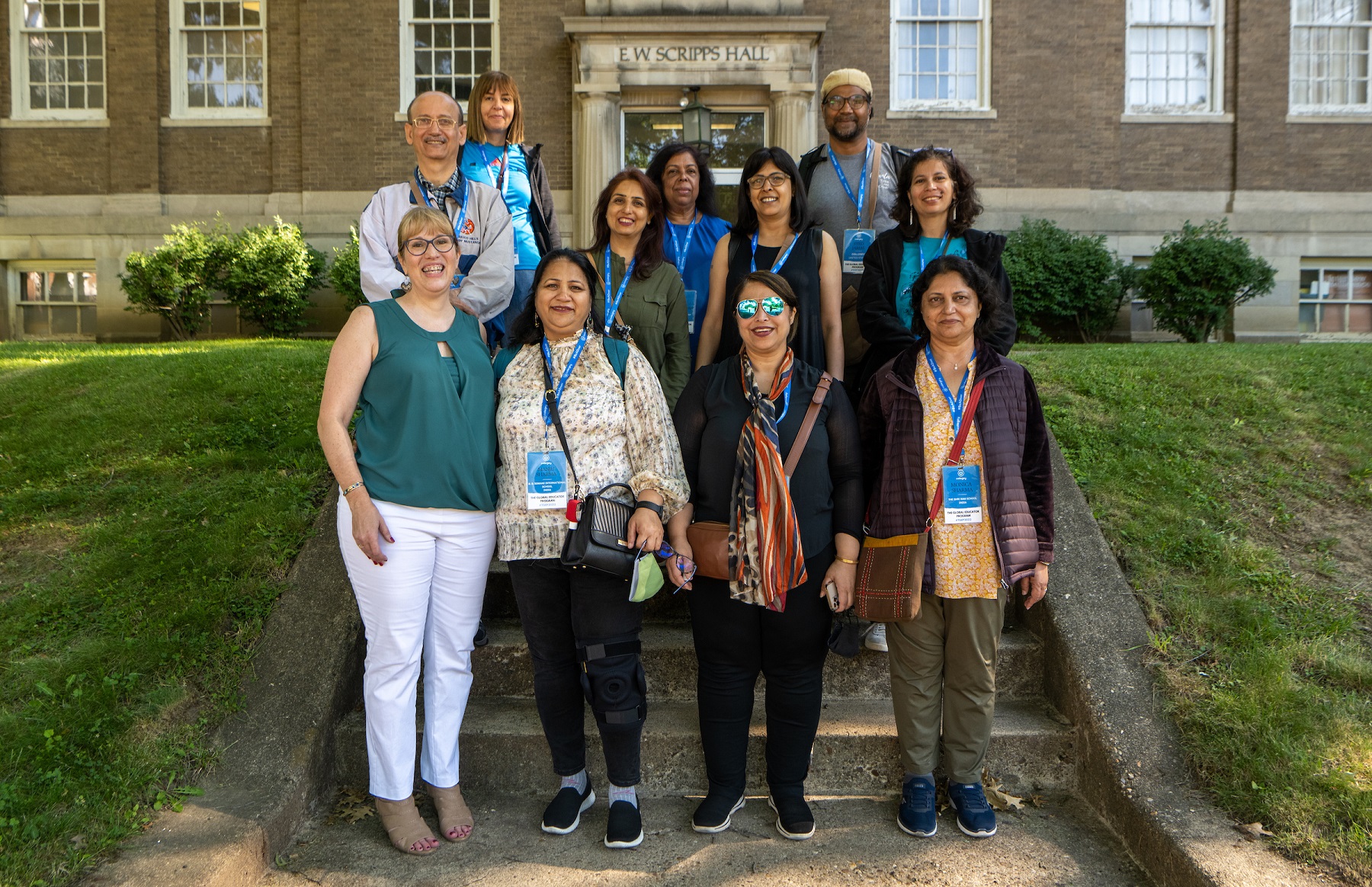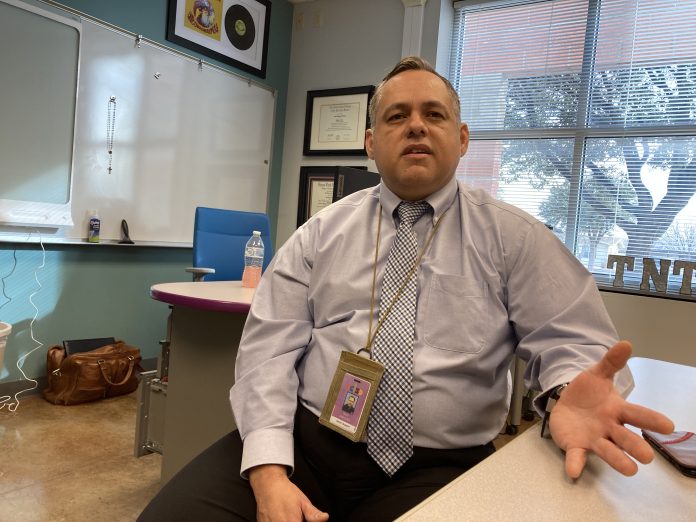First Black UM Admissions Counselor Brings Historical past to Mild
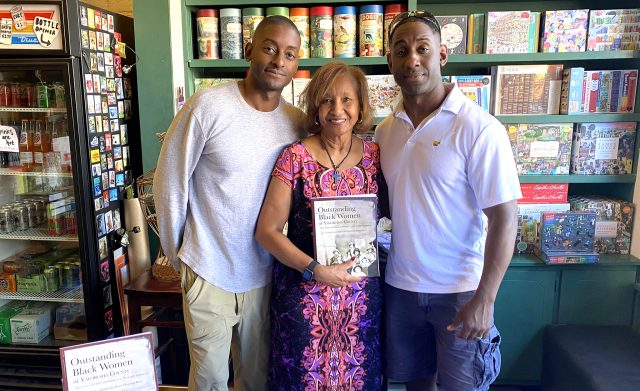

UM alumna Dottie Chapman Reed (heart) is accompanied by her sons at a book-signing occasion for ‘Excellent Black Ladies of Yalobusha County’ at Off Sq. Books in Oxford. The 2020 e book grew from her oral preservation efforts and work with the college’s Middle for the Examine of Southern Tradition. Submitted photograph
OXFORD, Miss. – Dottie “Quaye” Chapman Reed (BA 74) was the primary Black admissions counselor on the College of Mississippi, serving from from 1974 to 1977. Her in depth assortment of papers shall be on show on the UM Libraries’ Division of Archives and Particular Collections by early March as a part of the college’s commemoration of 60 years of integration.
The creator of “Excellent Black Ladies of Yalobusha County” (2020), Chapman Reed writes a column for the North Mississippi Herald highlighting histories of the world’s group members. She was additionally the primary recipient of the Jeanette Jennings Trailblazer Award, named in honor of the college’s first Black college member.
Chapman Reed mentioned her column, e book and assortment on the Two Museums in Jackson on Feb. 8. She additionally shall be a panelist on the annual assembly of the Mississippi Historic Society in Jackson on March 2.
She additionally answered a number of questions on her time on the college and her initiatives:
Inform me about your first experiences with the College of Mississippi.
I graduated from highschool in 1970, and our junior and senior years have been tough and fairly making an attempt as we knew that we have been going to be the final class to graduate from Davidson Excessive Faculty, the Black highschool in Water Valley, as the faculties can be built-in within the fall of 1970. Issues have been intense and full of blended feelings.
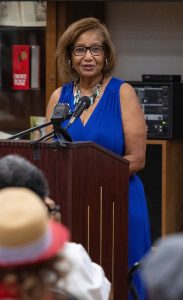
Dottie Chapman Reed speaks in September 2022 within the college’s J.D. Williams Library about her life story and efforts in oral historical past preservation. Picture by Thomas Graning/Ole Miss Digital Imaging Providers
Once I graduated, I needed to get away from Mississippi as shortly as doable, (and) I went to Detroit with certainly one of my girlfriends. She discovered a job and stayed. I couldn’t discover a job; due to this fact, with no different choices, I needed to come again to Mississippi. My mother mentioned, “Properly, I assume you’re going to go to highschool.”
The night time earlier than registration opened, she drove me to Oxford to remain on the residence of Miss Doxey Foster, a church good friend. I spent the night time and Miss Foster known as Jennifer Jackson, a pupil who was already enrolled at Ole Miss, to come back and choose me up and take me to campus. I used to be completely misplaced. I had nothing. I had no room, no monetary support, nothing.
Luckily, after we obtained there, I bumped into two mates from highschool who took me by the hand, carried me down on the coliseum flooring and obtained me registered for lessons. I used to be in a position to enroll as a result of I had attended pre-college in ’68 or ’69 primarily based on an invitation from my residence lady, Beatrice Hawkins; due to this fact, I had mainly already utilized for admissions and was accepted.
What was it wish to be an African American pupil on the College of Mississippi then?
As Black college students within the ’70s and early ’80s, whereas we had our fears and considerations, we have been a really shut group. We knew one another, have been organized and supportive of one another. We needed everybody to succeed and obtained excited with the breakdown of every racial barrier.
Upperclassmen supplied tutorial help by our adviser, (the) Rev. Wayne Johnson. He was our assist system, mentor, encourager and lifesaver for a lot of. The native Black pastors and group leaders have been staunch supporters who opened not simply the doorways of their church buildings however the doorways of their houses as nicely.
I might title many others who mentored and cared for us and skilled us in management and group activism. They inspired our enrollment and have been pleased with our successes on the college. We have been fairly impressed with the problems being addressed by the native authorized providers workplace in Oxford. We discovered function fashions, steering and assist from upperclassmen, from graduate and regulation college students.
We had an energetic Black Scholar Union and a piece within the Scholar Union the place we congregated, the place we developed comradery and power when wanted. The unity, brotherhood and closeness helped us succeed.
We have been additionally inspired as further Black college got here on board. The campus counseling heart supplied tutoring, testing and a category known as Efficient Examine that proved to be useful to some college students.
How did you come to work in admissions?
As a pupil, my work-study job was within the pc heart in Service Corridor, and that’s the place the blokes from admissions would come to course of grades and paperwork. I ran the keypunched knowledge playing cards by the mainframe pc and did among the key punching. I obtained to know these gents, and so they requested me if I needed to work registration.
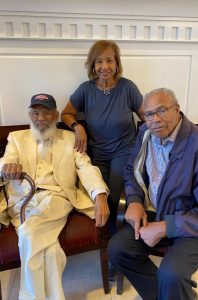
Dottie Chapman Reed (heart) spends time with James Meredith (left) and the Rev. Wheeler Parker Jr., a cousin of Emmitt Until, at The Inn at Ole Miss. Submitted photograph
I began working registration below Dr. David Ross and Dr. Mamie Franks. I did numerous issues, pulling playing cards for various lessons on the coliseum flooring or working errands between the pc heart and the admissions workplace.
In my final semester, Ben Jones, a graduate pupil who was working with Dr. Ken Wooten in admissions, instructed me that they’d determined to rent the primary Black admissions counselor and inspired me to use. Being that I used to be on the brink of graduate, I assumed, “OK, possibly I’ll apply.”
My fundamental purpose was not a lot to recruit college students for the college, however to encourage younger individuals to go to varsity and get a level, and to know that if I did it, they may do it too, even from a predominantly white faculty, or that they may go anyplace they needed to go. My gratification got here in explaining to them the admissions and monetary support processes and answering no matter questions they’d about school.
It was an attention-grabbing expertise certainly, as I visited white faculties and Black faculties and built-in faculties. It was at among the white faculties, particularly, that they have been most shocked to see a Black individual recruiting for the College of Mississippi.
It was additionally a studying expertise for me by way of studying give displays, reply questions, journey throughout the state and into west Tennessee. Spending nights in accommodations and consuming at eating places was all new to me. All and all, it ready me for my profession challenges and accomplishments in company America and past.
Inform me concerning the private assortment you donated to the College of Mississippi Libraries’ Division of Archives and Particular Collections.
Once I was in class, I stored loads of clippings whereas on the college between 1970 and 1977. At any time when there was any person Black within the Day by day Mississippian, I stored the article – for instance, if it was concerning the Black athletes, Blacks working for homecoming queen or others comparable to my roommate, Dorothy Balfour, who was one of many girls who began the primary Black sorority.
Even I wrote an article within the Day by day Mississippian concerning the lack of monetary support for college kids in the summertime.
The Rev. Wayne Johnson, our BSU adviser, had somewhat co-op retailer on Jackson Avenue and revealed a newspaper known as the Soul Power. Black journalism college students produced a publication known as The Spectator. Copies of each newspapers are included in my assortment. My assortment additionally contains my trailblazer award, the award the scholars gave me after I left Ole Miss, an Ole Miss First award and my life thus far past Ole Miss.
I made a decision to offer my papers and memoirs to the library primarily for the schooling of the present college students, for the generations to come back and for my grandchildren. I’ve all the time felt the college wanted to extra intimately linked with the higher Black communities throughout the state, particularly just like the one which I got here from solely 18 miles away.
Solely lately, did I grow to be conscious that fairly a number of individuals from Water Valley labored on the college as janitors, together with my first cousins, Senie and C.W. Willingham, who labored within the cafeteria, after I was in class. Due to their sacrifices and contributions, and people of many others, I hope my assortment will assist educate and acknowledge the early contributions of Blacks to the college.
What are your hopes for the way forward for the College of Mississippi and the way does it evaluate to the establishment you knew within the Nineteen Seventies?
Primarily based on my current expertise working with two former UM professors, Dr. Jessica Wilkerson and Dr. B. Brian Foster, over a three-year interval, it might be nice to see the college make investments substantial funding to assist community-driven analysis. The individuals of Mississippi, particularly the Black communities, deserve extra.
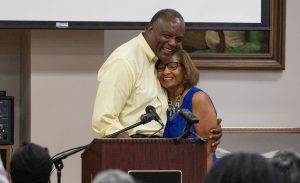
Dottie Chapman Reed (proper) is greeted by former Ole Miss and NFL soccer participant Curtis Weathers in September 2022 within the college’s J.D. Williams Library. Picture by Thomas Graning/Ole Miss Digital Imaging Providers
Our “Black Households of Yalobusha County” undertaking, which grew out of my collaboration with the Middle for the Examine of Southern Tradition, and Dr. Jodi Skipper’s “Behind the Massive Home” undertaking, in Holly Springs, are two examples of what could be completed on a shoestring price range. It might be proactive, instrumental and intensely helpful for the encompassing communities if the college would fund initiatives like these.
Very similar to most predominantly white establishments nationwide, the college has made good progress in growing minority accomplishments and attaining range by way of enrollment, commencement, college, athletics and educational development. It has achieved quite a few firsts that weren’t in place within the Nineteen Seventies after I was a pupil and administrator.
But the necessity for additional development, historic reconciliation and continued schooling exists.



